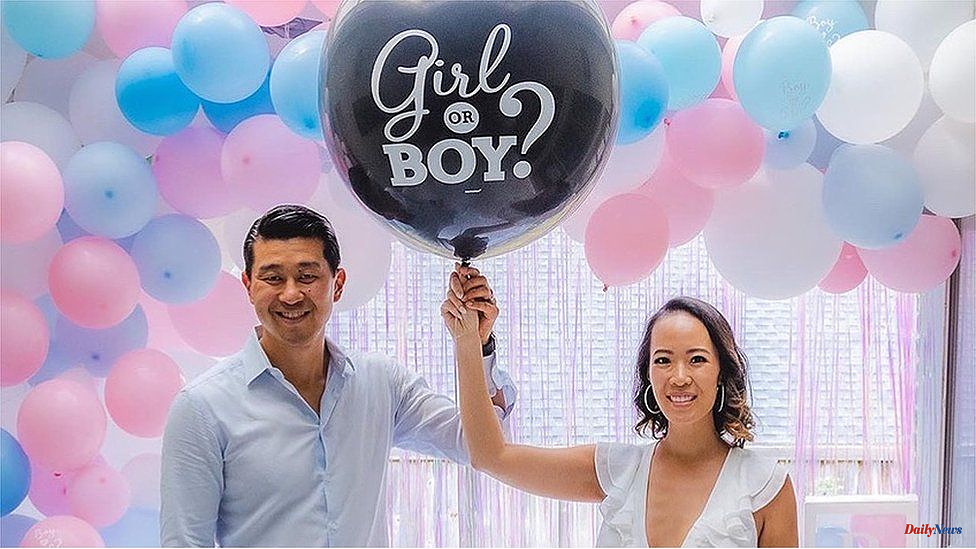Carol Chen, a successful entrepreneur who was born and raised in Texas has established a life and several fashion companies in Singapore.
She had always longed to be a mother. There was one problem. It was no problem for her to have her designs displayed at Paris Fashion Week. It is much harder to find a partner in life.
She began to worry when she was in her thirties.
"I've just read a lot of online material that claims your body becomes less fertile at 35. She says she started to panic.
Because she was single, she decided it was time to freeze her eggs. This preserves fertility and allows her to try for children later.
This is a relatively new procedure and success rates can vary depending on the number of eggs that the woman freezes as well as her age.
In-vitro fertilization (IVF) cycles using frozen eggs were studied in 2016. A 2016 study found that 15% of live births occurred for women who had frozen five eggs before they turned 35. This chance was 61% for women who had froze 10 eggs, and 85% for those who had froze more than 15 eggs.
A recent study showed that 70% of women who had frozen eggs before they turned 38 and then thawed at most 20 eggs later, had babies.
It is important to remember that IVF is a low-birth rate procedure. According to the UK's Human Fertilization and Embryology Authority, this is just 24%.
Despite these odds, egg freezing is growing in popularity. For example, 10,936 Americans froze eggs in 2017 - 23 times more than in 2009. But that doesn't feel like it.
Singapore is the latest country that lifted the ban on egg freezing in non-medical purposes. This will take effect from January 2023.
The NHS does not cover egg freezing in the UK unless there are medical conditions that could affect your fertility. The UK Government has recently set a 10-year storage limit for frozen eggs. However, embryos and sperm will be disposed of.
It's obvious that the process is expensive. Carol spent nearly $14,000 (PS11,000.400) on one round of egg freezing. She also had to travel across the US for it. She wasn't able to get as many eggs as she wanted which made her feel "less feminine."
She is thrilled for the women of Singapore and hopes that many other Asian countries will join her in this joy.
She says that even in the US, being an Asian-American, it can be taboo to become a second-generation immigrant. However, she also feels that falling fertility rates could force authorities into some countries.
Carol was fortunate in the end. Carol never had to worry about having to pay for egg freezing again. She met her husband two years ago and was able to conceive naturally in 40s.
However, the actual percentage of women who use frozen eggs is still very low at below 10%.
Another mini-study analysed data from London’s two largest fertility clinics. Only about a fifth (or 5%) of patients who had frozen eggs at the clinic returned to use them over the ten-year span 2008-2017.
Employers have continued to include it in their ever-expanding range of fertility benefits.
Unsurprisingly, the trend began in Silicon Valley in 2014 when Apple and Facebook offered egg freezing as part of their benefits packages.
Eight years later, big corporations are struggling to retain and recruit workers. So fertility benefits have become a necessity. Only 40% of the US's largest companies offer them, meaning those with more than 500 employees.
Some firms are beginning to do the same in Europe with its more generous and state-funded healthcare services. Hootsuite is one example.
Companies like Centrica, a UK energy company, and NatWest, offer PS45 000 to employees for the right treatment.
Jenny Saft is the co-founder and CEO of a platform that provides fertility benefits to employers in Europe. The picture is complicated and there are restrictions and limitations in accessing state-funded fertility treatment. Companies are becoming more proactive.
For example, Germany's health insurance covers half of the cost for three IVF cycles. However, this is only for married couples or those in heterosexual relationships and women under 40.
However, not everyone believes that directly involving a boss or company in your fertility is good news.
Dr Lucy Van De Wiel, a lecturer in Global Health and Social Medicine from King's College London is Lucy Van De Wiel. These employment policies are a "PR technology" that attracts and retains female staff. This is how the insurance companies sell them to employers.
Dr Van De Wiel worries that the insurer will take a more central role in people's reproductive decisions, which could lead too much commercialisation of fertility.
While she recognizes that it is great for women to have more information about fertility, her concern is that this education could be coming directly from companies that can benefit financially from those who use these technologies. It's difficult to avoid conflict of interests.
This is especially true when it comes egg freezing. Unlike IVF, nearly all women under the age of 18 could be considered potential clients. Any woman who wants to have children in the future may be eligible for egg freezing.
Dr Van De Wiel states that there have been studies that show women who receive these services are happy to have choices but feel they are being told by their employer to have children.
Nyasha Foy is a New York-based entertainment lawyer.
She accepted the offer from her firm to pay for two rounds egg storage and freezing.
She says, "I do believe that the idea of giving you $10,000 to freeze eggs, and the return on your investment in working one or more years in this business is a win." You feel a bit funny when you think about it.
Ms. Foy believes that women can alter the dynamics and take control of their lives.
She explains that she didn't meet her man in college and didn't meet her man in law school. "So there's this feeling in your back of your mind that you should hurry up and have a child." I am okay with the commodification, especially in America where we are having to revisit Roe V Wade. To be able say that as a woman, it is better to wait. She concludes that this choice is not just about body autonomy but also life autonomy.
It is clear that egg freezing is gaining momentum in developed countries, and fertility clinics are working hard to attract clients by all means possible.
Aimee Eyvazzadeh is a fertility doctor based in California. She is also known as the "egg whisperer". She is well-known for hosting egg freezing parties at "swanky restaurants with beautiful bar and delicious food."
It is a concern that freezing is used as a means of "taking control" or as an insurance policy. She adds that you might have given yourself a chance in the future, but it may not be as good as you thought.
Dr Eyvazzadeh has an average patient age of 39 years. Eyvazzadeh believes that this number could reach 49 in 15 years. She believes that young women who are not experiencing fertility problems should consider freezing their eggs "for their 40-year old selves".
Nyasha Foy, who lives on the opposite side of the US is pondering her next steps. Although she hasn't used her frozen eggs yet, she is still hopeful to meet her "baby daddy".
"I'm 37 now. She says, "If I reach a point where I cannot carry a baby, then I'm in a position where it is possible to get a surrogate."
"I want to become a mother. I know I will get there. Although I don't know when or how, I have done my best to give myself the best chance.












